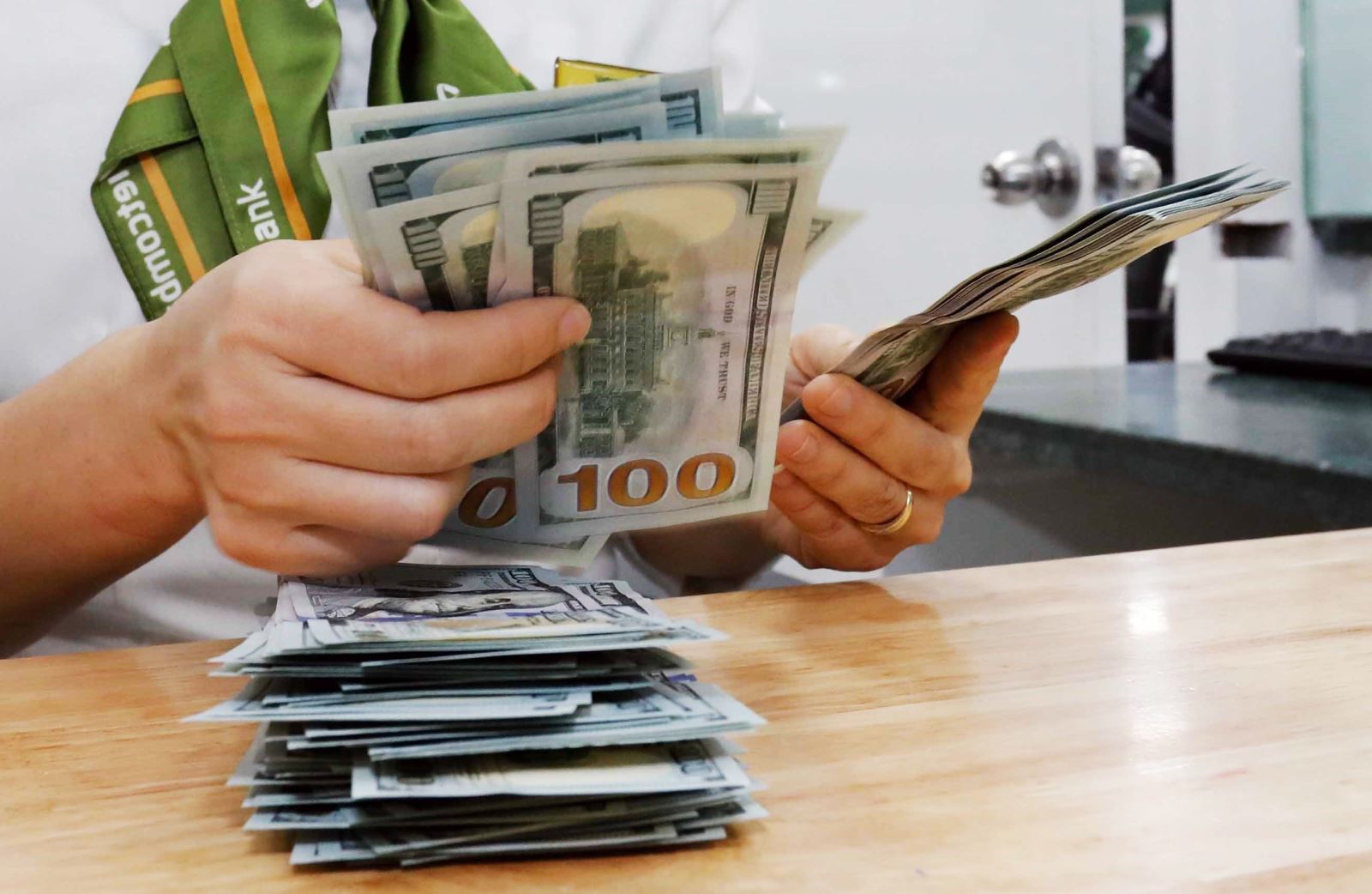
Strong fluctuations
In the 2024 currency market summary report, Dragon Capital Securities (VDSC) stated that the USD/VND exchange rate experienced a year of significant fluctuations, with the pressure on the VND's depreciation increasing especially strongly in the second and fourth quarters.
According to VDSC, the movement of the USD/VND exchange rate this year is greatly affected by the trend of the USD in the international market. The correlation coefficient between the US Dollar Index (DXY) and the USD/VND exchange rate in 2024 was recorded at 0.67, higher than the previous year's 0.63.
Closing last week, the central exchange rate announced by the State Bank on December 27 reached 24,322 VND/USD. The reference exchange rate at the State Bank's Exchange is 23,400 - 25,450 VND/USD (buy - sell). At commercial banks, the USD exchange rate also increased to 25,238 - 25,538 VND/USD (buy - sell) at Vietcombank and 25,218 - 25,538 VND/USD (buy - sell) at BIDV.
Data from VDSC shows that compared to the beginning of the year, the central exchange rate has increased by about 1.9%. In the official market, the exchange rate increased by about 4.8% to 25,430 VND/USD, while in the free market, the exchange rate increased by 4.3% to 25,840 VND/USD.
According to Bloomberg and BIDV research group, as of the end of November 2024, the VND had depreciated by 4.25%. However, the exchange rate still maintained an increase below the 5% threshold set by the State Bank as 2024 neared its end.
Looking back at developments since the beginning of the year, Dr. Vu Mai Chi, Lecturer of Banking Faculty, Banking Academy, said that in the first 8 months of the year, the exchange rate was greatly affected by fluctuations in the USD and international economic factors. However, since August, the exchange rate has gradually stabilized, although there was a slight increase in October, but in recent weeks, the situation has returned to stability.
"The State Bank continues to maintain a low and stable interest rate policy to support economic recovery while controlling inflation. However, challenges still exist, especially the interest rate gap between VND and USD in the interbank market, which boosts foreign currency demand and puts pressure on the exchange rate. In addition, the sharp increase in imports and the need for foreign investors to transfer profits back to the country also put additional pressure on the foreign exchange market," said Dr. Vu Mai Chi.
Sharing the same view, economist Dr. Nguyen Tri Hieu assessed that the 2024 exchange rate of the VND/USD pair will be affected by many factors, especially the US monetary policy. In the first months of the year, the US Federal Reserve (Fed) continued to maintain a tight monetary policy by keeping interest rates high. However, recently, the Fed has changed direction, reducing interest rates and shifting from a tight policy to a loose monetary policy, leading to fluctuations in the value of the USD.
Assessing the impact, Dr. Nguyen Tri Hieu said that the US Dollar Index (DXY) fluctuating between 101 and 107 points has directly affected the USD/VND exchange rate. When the value of the USD increases, it means that the value of the VND decreases, causing the exchange rate to increase. This brings both benefits and challenges to import-export activities and inflation control.
Specifically, the expert analyzed that on the export side, when the exchange rate increases, export enterprises earn foreign currency, after converting to VND, they will receive more money, creating an advantage for export activities. On the contrary, on the import side, the increase in exchange rate causes the price of imported goods in foreign currency to increase. This not only increases import costs but can also push up domestic goods prices, contributing to increased inflation. Therefore, exchange rate fluctuations in 2024 will not only affect import and export activities but also affect the overall inflation rate of the economy.
What variables for 2025?
Entering 2025, the VND/USD exchange rate is forecast to face many pressures. Citing a report from the International Monetary Fund (IMF), Dr. Vu Mai Chi said that global growth is forecast to reach only 2.8%, lower than the 3% of the previous year, due to high inflation in many major economies and trade tensions, especially the Russia-Ukraine conflict and protectionist policies. In addition, an important factor affecting the global economy is the trend of interest rate reduction from major central banks, such as the Fed, to stimulate growth when inflation is controlled. This will lead to a trend of global interest rate reduction, affecting both developed and developing economies, including Vietnam.
"However, Vietnam's economy will maintain a strong recovery momentum in 2025. GDP is forecast to grow by about 6.8-7%, thanks to supporting factors such as industrial production, exports and attracting foreign direct investment (FDI). The Government and the State Bank will continue to implement policies to promote investment and support businesses, especially small and medium enterprises," said Ms. Chi.
However, Dr. Vu Mai Chi noted that Vietnam will also face risks from exchange rate fluctuations and changes in trade strategies of major economies, especially the protectionist policies of the US under the leadership of President-elect Donald Trump. The protectionist policies of the Trump administration could increase trade barriers and affect exports and FDI flows into Vietnam.
Sharing the same view, Dr. Nguyen Tri Hieu predicted that in 2025, the USD/VND exchange rate may continue to be strongly affected by the economic policies of US President-elect Donald Trump. Specifically, Mr. Trump's tax reduction policy for high-income earners is expected to increase the US budget deficit, which may lead to the US government having to issue bonds with high interest rates to stabilize finances. As a result, inflation may increase, forcing the Fed to adjust monetary policy, shifting from a loose to a tight state, and increasing interest rates again. When interest rates in the US increase, the value of the USD will strengthen, while decreasing the value of the VND, leading to an increase in the USD/VND exchange rate.
"The possibility of a sharp increase in the VND/USD exchange rate will significantly impact the State Bank's monetary policy. If the exchange rate increases, inflationary pressure in Vietnam will also increase. In that situation, the State Bank may need to pivot its monetary policy, including raising interest rates, along with other policies to reduce pressure and control inflation. This pivot may be a necessary step to stabilize the macro economy in the context of global fluctuations," said Dr. Nguyen Tri Hieu.
In a recent report, UOB Bank forecasts that the USD/VND exchange rate could reach a record high of 26,200 in the third quarter of 2025. Specifically, the USD/VND exchange rate is expected to be at 25,800 in the first quarter, increase to 26,000 in the second quarter, peak at 26,200 in the third quarter, and decrease slightly to 26,000 in the fourth quarter of 2025.
On the other hand, Standard Chartered Bank in its latest report forecast that the USD will weaken in the first half of 2025 before recovering strongly by the end of the year. Standard Chartered also warned that from the second quarter of 2025 onwards, former President Donald Trump's policies could put great pressure on the exchange rate, forcing the State Bank of Vietnam to raise the operating interest rate.
Source: https://doanhnghiepvn.vn/kinh-te/nhung-bien-so-nao-se-lam-gia-tang-ap-luc-ty-gia-trong-nam-2025/20241230085554674





![[Photo] Prime Minister Pham Minh Chinh works with the Standing Committee of Thai Binh Provincial Party Committee](https://vphoto.vietnam.vn/thumb/1200x675/vietnam/resource/IMAGE/2025/5/12/f514ab990c544e05a446f77bba59c7d1)
![[Photo] Prime Minister Pham Minh Chinh starts construction of vital highway through Thai Binh and Nam Dinh](https://vphoto.vietnam.vn/thumb/1200x675/vietnam/resource/IMAGE/2025/5/12/52d98584ccea4c8dbf7c7f7484433af5)
![[Photo] Prime Minister Pham Minh Chinh receives Swedish Minister of International Development Cooperation and Foreign Trade](https://vphoto.vietnam.vn/thumb/1200x675/vietnam/resource/IMAGE/2025/5/12/ae50d0bb57584fd1bbe1cd77d9ad6d97)
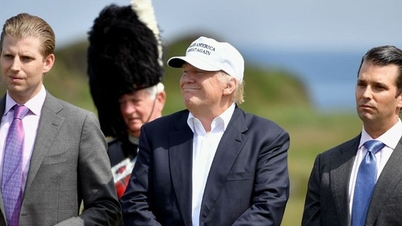

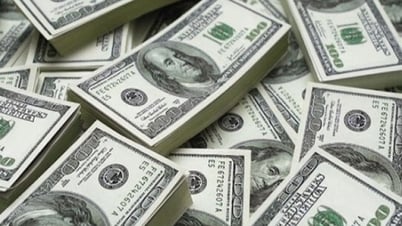




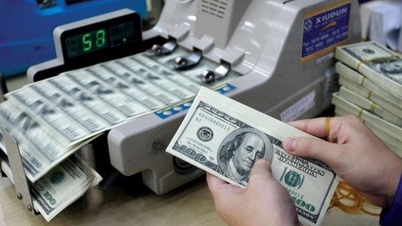

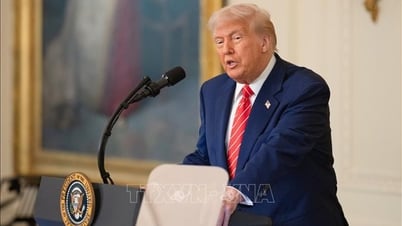

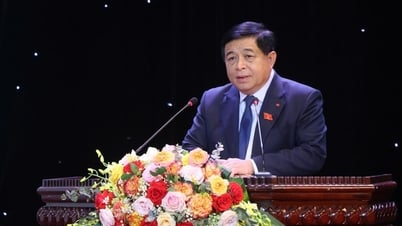









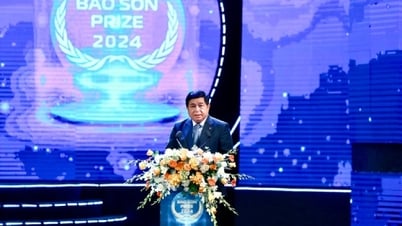






































































Comment (0)